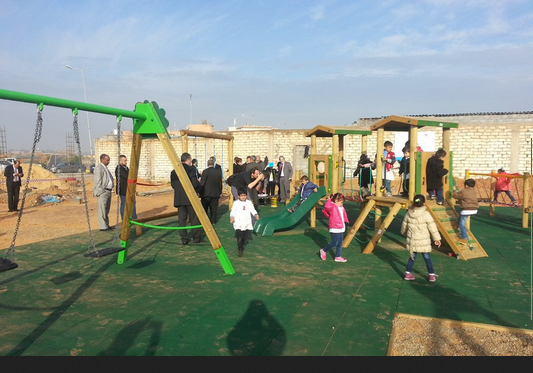Libya has inaugurated the first of 13 playgrounds bought and installed with support from UNICEF, creating safe and peaceful recreational spaces for children.
Libya has only a few public recreational spaces for children to play in, and often those that exist are neither safe nor child friendly.
As part of the humanitarian assistance after the 2011 Revolution and transition to developmental work, UNICEF and the Ministry of Local Government signed an agreement for the installation, maintenance and operation of 13 playgrounds in chosen locations across Libya.
The first playground under this agreement is now operational, bringing a lot of smiles and laughter to children aged 3 to 11 in the Abu Slim area in Tripoli.
“The playgrounds are a vital contribution for the healthy development of our children in Libya, and the Ministry of Local Government will make sure that this excellent initiative is being successfully implemented in selected locations all over Libya, “ said Mohamad ElHaji, Libya’s Deputy Minister of Local Government.
Play contributes to children’s physical, cognitive, emotional and social development, and participation in play is enshrined as a right of all children in article 31 of the Convention on the Rights of the Child.
UNICEF’s Regional Director for Middle East and North Maria Cavilis says all children, regardless of their background desire the same thing – a place to congregate and play. “ UNICEF is committed to working with the government of Libya to build a peaceful, inclusive society where all children, youth and adolescents have access to equal opportunities and in which their rights are understood, and upheld, “ she explained.
The UNICEF Regional Director requested the Ministry of Local Government to replicate the initiative in other areas across Libya to ensure that as much children as possible benefit.
The playgrounds have been located across Libya in areas deemed safe, based on the degree of Unexploded Ordnance and the level of damage to the schools.
It is expected that the playgrounds will be a source of joy for both children and parents alike, enabling children to safely navigate the complexities of social interaction and allowing the parents to earn a living while they plan a future for their children.
(Source: UNSMIL)





